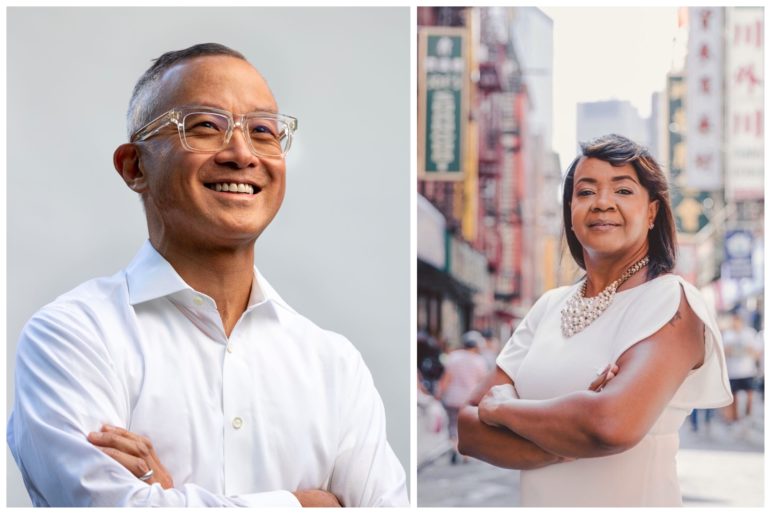Art Chang, co-creator of NYC Votes, and Joycelyn Taylor, an entrepreneur from Brooklyn, told City Limits on Monday that they would be cross-endorsing one another in the mayor’s race.

Chang and Taylor campaigns
Art Chang, co-creator of NYC Votes, and Joycelyn Taylor, an entrepreneur from Brooklyn,are cross-endorsing one another in the mayor’s race.New York City’s new ranked choice voting system, which allows voters in special and primary elections to select up to five preferred candidates in each race, is already influencing how some local advocacy groups are making endorsement decisions.
It’s also prompted two competitors in the mayor’s race to cross-endorse one another. Art Chang, businessman and co-creator of NYC Votes, and Joycelyn Taylor, an entrepreneur, told City Limits on Monday that they would be cross-endorsing one another in the mayor’s race. Both candidates said they want voters to rank them, but also to put the other on their ballot.
“Ranked-choice voting was supposed to bring these kinds of alliances and to have a discussion about the future of our city,” said Chang, a former financial executive and startup founder who previously worked in city government. “And instead, we’re seeing candidates attack each other relentlessly.”
Last week, both Andrew Yang and Eric Adams, considered frontrunners in the mayor’s race, traded allegations of ethical impropriety. Both campaigns asked the city Campaign Finance Board to investigate the other.
Chang and Taylor, however, are opting more for coalition instead of competition, they said, especially because they share similar values.
“There is a unique opportunity that ranked choice voting brings,” said Taylor, an East New York, Brooklyn native who owns a general contracting firm. “It’s an opportunity to collaborate.”
Increased city investment in affordable housing is a priority for both campaigns: Chang hopes to creatively increase New York City’s portfolio of developable land, his website says, even considering developing housing on local golf courses, “starting with the Trump course in the Bronx.” In his housing proposal, NYCHA residents would also have first rights to new housing.
Taylor, who said she has “lived more years of my life in NYCHA than anywhere else in the city,” is also focused on improving conditions for residents there. She’d also like to encourage further city investment in local minority- and women-owned businesses, she said.
Taylor and Chang may consider a third candidate to cross-endorse ahead of the June 22 primary, they told City Limits. Early voting starts June 12.
While ranked-choice voting was used in a few special election races for open City Council seats earlier this year, the primary will mark the first citywide implementation of the new system, which lets voters rank up to five candidates for a given seat in order of preference. If no candidate clears at least 50 percent of votes after the first count, the person with the fewest votes is eliminated, and their ballots redistributed to the remaining contenders. This process of elimination continues until just two candidates are left.
Candidates competing for the same seat have made similar cross-endorsements in other cities that utilize ranked choice voting: Two Democrats running for San Francisco mayor in 2018 backed each other, though neither ultimately prevailed in that race.









